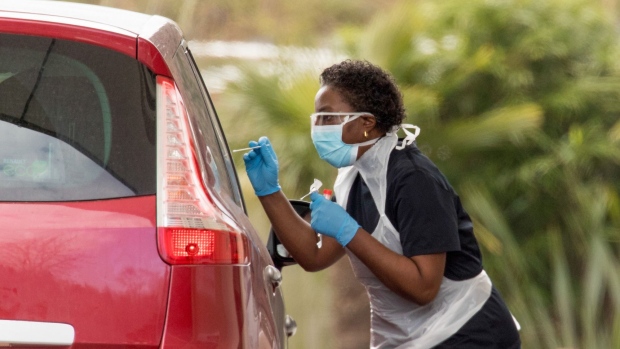Jul 15, 2020
Key U.K. Covid Trial to Add Drug to Tests Before Winter Threat
, Bloomberg News

(Bloomberg) -- Researchers testing potential treatments for Covid-19 in a key U.K. trial are planning to expand its list of drugs under study in preparation for a possible second wave of the virus this winter.
The Recovery trial, which has enrolled more than 12,000 hospitalized patients, will add a monoclonal antibody treatment to the study in the fall, Peter Horby, its chief investigator, said Tuesday in an interview. Which drug makes it into the study will depend on companies’ safety data and ability to meet supply needs, he said.
Doctors are desperate for new coronavirus therapies as cases continue to rise in the U.S. and Brazil, while resurgences have appeared in some parts of Asia. A new wave of U.K. infections this winter could lead to as many as 120,000 hospital deaths from September to June, researchers from the country’s Academy of Medical Sciences said Tuesday in a report.
“We’re working on the assumption that Covid’s not going away,” Horby said. “We may even get a second wave of cases over the winter so we’re planning for that.”
NHS Power
The Recovery trial has harnessed the power of Britain’s National Health Service to test drugs in as many patients as possible, with more than 170 hospitals participating. Showing quick results, it has reported outcomes for three of six treatments tested since starting in March.
In June, Recovery scientists said that the inexpensive anti-inflammatory dexamethasone reduced deaths by one-third among coronavirus patients on mechanical ventilation. It was the first drug shown to improve survival in patients with the deadly disease.
“Of all the drugs that you would have hoped would have worked, that’s the one,” Horby said, citing its accessibility and low price.
Monoclonal antibodies are seen as one of the best hopes for effective coronavirus treatment until a vaccine becomes available. To make them, drugmakers design immune proteins that prevent the virus from entering cells, and then produce them in bulk.
Ebola Treatment
The most successful drug for treating Ebola virus, the cause of sporadic, lethal outbreaks of disease in Africa, is a monoclonal antibody made by Regeneron Pharmaceuticals Inc. Others looking to make monoclonal antibodies against Covid include AstraZeneca Plc, Vir Biotechnology Inc., and Eli Lilly & Co. and its biotech partner, AbCellera Biologics Inc.
The Recovery study has faced questions for the decision not to include Gilead Sciences Inc.’s antiviral remdesivir, which has also been shown to help patients. The drug was set aside because of a lack of supply, and when Gilead offered to make more available, there was no longer space for it in the study, Horby said.
Of the three remaining treatments in the trial, tocilizumab -- an anti-inflammatory drug used for rheumatoid arthritis -- is expected to yield results next, according to Horby. Roche Holding AG, which produces the drug, has also been conducting its own trial and may release results this month, which could lead to an early look at the Recovery outcomes, Horby said. His team may also test a combination of tocilizumab with dexamethasone.
Results from the remaining two treatments -- the antibiotic azithromycin and convalescent plasma taken from recovered patients -- are expected next year.
More than 290,000 people have already been infected in the U.K. outbreak. At its peak, the trial was recruiting as many as 400 patients a day, Horby said; that has since fallen to around 20. Yet the model has worked so well the scientists are looking at use of the platform for trials in other viral respiratory infections such as influenza once the pandemic is over.
“Drug trials have been getting increasingly expensive, increasingly complex, and increasingly slow, and I don’t think that is always justified -- in fact a lot of it’s unjustified,” Horby said. “We need to use this as an opportunity to see how you can change how clinical trials are done.”
©2020 Bloomberg L.P.